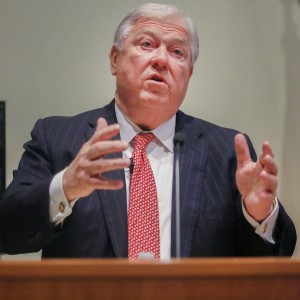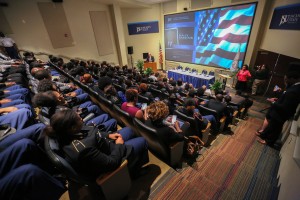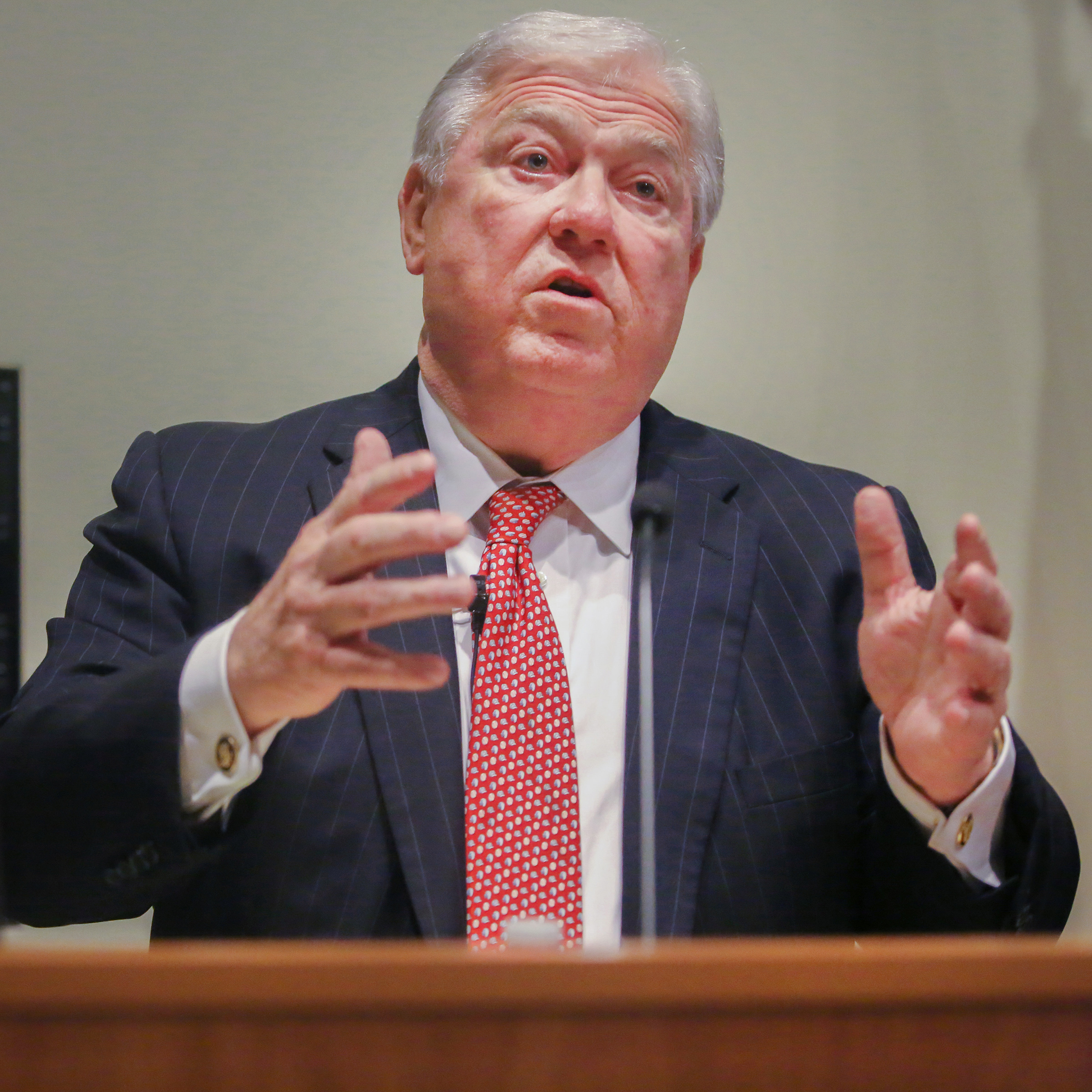Saying that young people are the ones who make change in politics, former Gov. Haley Barbour urged Jackson State University students to consider the Republican Party as a means to activism.

“We do not need a white party versus a black party,” he said of Mississippi’s predominately black Democratic Party and predominately white Republican Party. We need “salt and pepper” parties.
As part of the Mike Espy Scholars-in-Residence Series, Barbour spoke on “The Need for a Two-Party Political System in Mississippi” at the Student Center on Tuesday, saying that he joined the Republican Party while a college senior in 1968.
Mississippi, essentially back then, was a one-party system. In 1965, there was only one Republican mayor in Mississippi, he said. In 1968, only 6 percent of the voters identified themselves as Republican. “I always said, you had to be an optimist to be a Republican in Mississippi in 1968,” he said.
But since there were so few Republicans in the state, he said, during the administration of Republican Dwight Eisenhower in the 1950s, Mississippi was ignored and during the 1960s, Democrats took the state for granted.
JSU students might not remember, he said, that more Republicans voted for the Voting Rights Act of 1965 than did Democrats.
The “evolution” of the Republican Party took place in the South while he and fellow Republicans Thad Cochran and Trent Lott were young men.
Barbour, 67, a Yazoo City native, cut his political teeth in the administration of Ronald Reagan. He was chairman of the Republican National Committee from 1993 to 1997, and served two terms as Mississippi governor from 2004-12.
In his first term, he said he only received 10 percent of the Mississippi black vote, but that increased to 25 percent in his re-election.
Thousands of black Mississippi Republicans voted for him, he said, but they are only a small percentage of black Mississippians. He noted a few black Republican leaders whom he worked with, naming Les Range, Lee Bush and Wilbur Colom.

“It’s easier to govern” when there is overlap of the black vote, he said. Politicians, in his opinion, he said, should look out for the broad range of voters when governing.
Barbour took some shots at state Sen. Chris McDaniel, who complained about black voters casting ballots in the Republican Primary.
In answer to a question by Political Science student Daysha Brown, Barbour said, “We need more blacks to vote in the Republican Party.”
Barbour said he likes the way open primaries, as they are designated in Mississippi, are defined: without having to register for a party, but preventing party switching between runoffs.
Closing Republican primaries to all but registered Republicans would be bad for the party and the state, he said. Already, the trend in national political parties — and how congressional districts are configured — is to concentrate people of one party. The effect is that Congress is polarized: too many people right or left and “hollowed out” in the middle, he said.
Not only does that fail to represent the broad middle of American voters who claim to be independent (with Democrats and Republicans claiming about 40 percent of the voting population each), but it pushes politics to the extremes in order to hold party unity.
Closed party primaries only serve that “party purity” function, he said, adding: “Purity is the enemy of victory.”
Barbour fielded questions by moderator Rickey Hill, chair, Department of Political Science, and five students: Brown, Kiyah Burt, Isaiah Brydie, Jordan Carter and Juan Knight.
Most of the questions regarded whether it would be better to reject the two-party system or adopt a multi-party system.
Barbour defended the two-party system by saying that it’s more effective than multi-party systems found in Europe. There, coalitions can be ruled by extremist positions. With a two-party system, broad coalitions are almost assured. And, if not, the rise of independents can swing an election.
Moreover, with a three-party system, or larger, “it’s hard to stake out” a middle-ground position that can serve the most people. Two parties are forced to seek a broader constituency to win.
He also answered a variety of other questions including:
— Hillary Clinton’s candidacy and no Republican frontrunner — While she might appear a shoo-in, having opposition is actually good, he said, since a candidate “had to fight for it,” and “I’d rather have a candidate who has been through the (primary) process.”
— The Iran Letter by members of the Senate — In previous administrations any nuclear agreement like President Obama is seeking would be considered a treaty, he said, which two-thirds of the Senate would have to approve. That’s the gist of the opposition, he said, but even with Obama agreeing to some oversight, there’s no guarantee that Iran will agree, or that (since it’s not a treaty) some future president might reverse it the same as an executive order.
— Full funding for education in Mississippi — Barbour took issue with politicians who want their effectiveness in education leadership guided by the amount of dollars spent rather than the results they produce. Even so, he noted, his administration spent more for education than any previous one.
Barbour now is employed with the law firm Butler, Snow, O’Mara, Stevens & Cannada, PLLC, in Ridgeland, where he focuses on economic development and related matters.
Barbour was welcomed by Dr. Otha Burton, director of the JSU Institute of Government, sponsoring the event, and introduced by Dr. Robert Blaine, dean of Undergraduate Studies and CyberLearning.
A large contingent of Jr. ROTC members from Jackson public schools attended the lecture, welcomed by Burton.
Barbour also spoke during a previous Mike Espy Series event in February, recounting the days after Hurricane Katrina devastated the state a decade ago while he was governor.
In October, former Mississippi Secretary of State Eric Clark on “The Dangers of Polarization in American Politics.”
The series began in spring 2014, Burton said, when former U.S. Agriculture Secretary Mike Espy gave a presentation. Afterward, JSU President Dr. Carolyn W. Meyers named the series in honor of him and his career in public service.
Barbour’s lecture will be accepted as a paper, as have the others, that will become part of the archives of the government institute and will be uploaded to the JSU website for public viewing, at: https://www.jsums.edu/instituteofgovernment/the-mike-espy-scholars-in-residence-series/
For more information, contact Burton at otha.burton@jsums.edu or (601) 979-2339.







